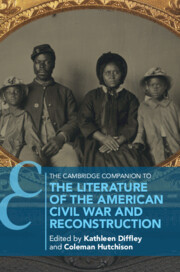Book contents
- The Cambridge Companion to the Literature of the American Civil War and Reconstruction
- The Cambridge Companion to the Literature of the American Civil War and Reconstruction
- Copyright page
- Dedication
- Contents
- Figures
- Contributors
- Acknowledgments
- Chronology
- Introduction
- Part I The Blind Ruck of Event
- 1 Violent Identifications
- 2 Reading, Sociability, and Warfare
- 3 Reconstructing the Civil War Literature of Injury, Illness, and Convalescence
- 4 “The Home and the Camp So Inseparable”
- 5 The Confederacy and Other Southern Fictions
- 6 The Civil War Ballad and Its Reconstruction
- 7 The Unfinished Drama of the American Civil War
- 8 Walt Whitman and the Reconstructive Impulse of Leaves of Grass
- 9 Reconsidering Moses
- 10 From “Facts” to “Pictures”
- Part II Worlds Made and Remade
- Suggestions for Further Reading
- Index
- Cambridge Companions to …
5 - The Confederacy and Other Southern Fictions
from Part I - The Blind Ruck of Event
Published online by Cambridge University Press: 04 August 2022
- The Cambridge Companion to the Literature of the American Civil War and Reconstruction
- The Cambridge Companion to the Literature of the American Civil War and Reconstruction
- Copyright page
- Dedication
- Contents
- Figures
- Contributors
- Acknowledgments
- Chronology
- Introduction
- Part I The Blind Ruck of Event
- 1 Violent Identifications
- 2 Reading, Sociability, and Warfare
- 3 Reconstructing the Civil War Literature of Injury, Illness, and Convalescence
- 4 “The Home and the Camp So Inseparable”
- 5 The Confederacy and Other Southern Fictions
- 6 The Civil War Ballad and Its Reconstruction
- 7 The Unfinished Drama of the American Civil War
- 8 Walt Whitman and the Reconstructive Impulse of Leaves of Grass
- 9 Reconsidering Moses
- 10 From “Facts” to “Pictures”
- Part II Worlds Made and Remade
- Suggestions for Further Reading
- Index
- Cambridge Companions to …
Summary
The Confederate nation was always an exercise in imagination. Southern nationalists, including Confederates and antebellum authors, viewed literature as integral to the project of nation-building. Just as the Confederacy would build its own world around the socio-economic system that defined the region—slavery—early southern nationalist and later Confederate novels speculated about a separate reality that fed into proslavery southerners’ understandings of themselves and their culture. This chapter explores the role of southern nationalist fiction in creating and sustaining an idea of the Confederacy from the antebellum period through the Civil War, using the example of novels and short fiction by authors such as Nathaniel Beverly Tucker, Augusta Jane Evans, and Richard Malcolm Johnston.
- Type
- Chapter
- Information
- The Cambridge Companion to the Literature of the American Civil War and Reconstruction , pp. 73 - 87Publisher: Cambridge University PressPrint publication year: 2022

